Where to buy face masks in the UK: Reusable coverings to shop now
It is now compulsory for hospitality staff to wear one, as well as customers unless they’re eating or drinking
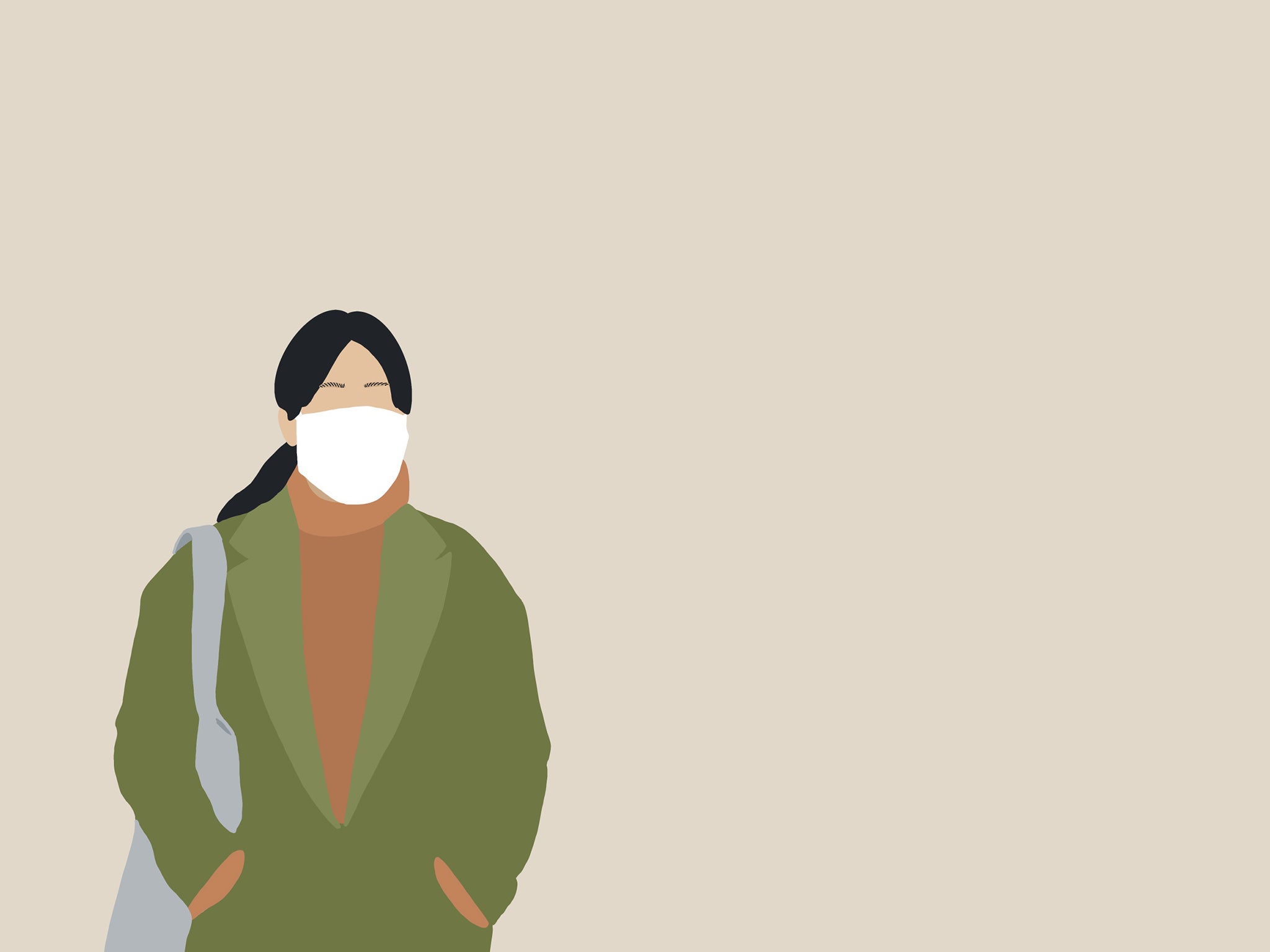
Your support helps us to tell the story
From reproductive rights to climate change to Big Tech, The Independent is on the ground when the story is developing. Whether it's investigating the financials of Elon Musk's pro-Trump PAC or producing our latest documentary, 'The A Word', which shines a light on the American women fighting for reproductive rights, we know how important it is to parse out the facts from the messaging.
At such a critical moment in US history, we need reporters on the ground. Your donation allows us to keep sending journalists to speak to both sides of the story.
The Independent is trusted by Americans across the entire political spectrum. And unlike many other quality news outlets, we choose not to lock Americans out of our reporting and analysis with paywalls. We believe quality journalism should be available to everyone, paid for by those who can afford it.
Your support makes all the difference.Ever since coronavirus began spreading across the world, there has been some debate on the use of face masks, including who should wear them and the benefits of them.
From 24 September all hospitality staff must wear them, as well as customers when they’re inside pubs, cafes and restaurants apart from when they’re eating or drinking.
People must also wear them on public transport, in taxis, supermarkets, indoor shopping centres, banks, post offices, travel hubs and shops, as well as in the indoor settings where you're likely to come into contact with people you don't normally meet, including cinemas, museums, galleries and places of worship.
In an announcement in the House of Commons on 22 September, the prime minister revealed that these rules could remain in place for six months in order to curb the rising coronavirus cases in England.
People who don't wear one will face a fine of £200, apart from those with certain medical conditions, children under 11 and those who lip-read.
In Scotland and Ireland, it's compulsory to wear one in shops and on public transport. While coverings are also mandatory on public transport in Wales, they aren’t anywhere else. Where social distancing is not possible, the Welsh government are advising people to wear masks in crowded places, but this is not an obligation.
These coverings can be made from things you've already got at home, like an old T-shirt, or even a sports sock with just a few well-made snips with scissors and a little bit of sewing. But if you're not so confident in your creative abilities, there are plenty of brands are creating their own too, which we've rounded up below.
What is the difference between a face covering and a medical face mask?
According to professor Trish Greenhalgh, professor of primary care health sciences at the University of Oxford, a medical face mask is designed to protect healthcare workers from germs emitted by sick patients.
“Many infections are spread by droplets, which are relatively large when they first come out as a cough or a sneeze but become much smaller as they travel through the air and become aerosolised. A medical mask must have a very fine weave because its job is to protect the wearer from tiny aerosolised particles,” she told The Independent.
A cloth face mask, however, works by blocking the bigger droplets before they become aerosolised. “Its job isn’t to protect the wearer but to block the source of infection (what’s known as 'source control'). Woven fabrics like cotton are very good at source control but less good at protecting the wearer,” she says.
The government was clear in its guidelines that face coverings are not the same as a face mask such as the surgical masks or respirators used as part of personal protective equipment by healthcare and other workers, and it reiterated that these supplies must continue to be reserved for those who need it.
The World Health Organization (WHO) updated its guidelines on 5 June to recommend that governments ask everyone to wear fabric face masks in public areas where there is a risk of transmission of Covid-19, in order to help reduce the spread of the pandemic disease. However, it has stressed that face coverings are only one of a range of tools that can reduce the risk of viral transmission, and should not give a false sense of protection.
It's also important to note that while valves are a common sight in some face coverings, avoid buying a face covering with a valve, as they do very little. Marisa Glucoft, director of infection prevention Children’s Hospital Los Angeles explained why they're ineffective: “When you wear a mask with a valve, people around you are not protected because the valve lets all of your breath into the air.”
What are the benefits of wearing a homemade face covering?
“The main benefit is most of your germs will be caught in it, making you less of an infection risk to others. My mask protects you; yours protects me", explains professor Greenhalgh.
"I think we will soon see more and more people wearing face coverings in public places and that these coverings will soon become a sign that it’s safe to interact,” she adds.
Dr Simon Clarke, associate professor in cellular microbiology at the University of Reading however, stresses that evidence of the effectiveness of wearing face masks to prevent spread of infection is limited.
“If not universally enforced as a recommendation it will do virtually nothing to prevent spread, and the risks of increasing infection might even outweigh the benefits,” he told The Independent, adding that mask-wearing is much less important than social distancing measures and proper hand hygiene.
Who should be wearing a face covering?
The official advice from the government's Covid-19 recovery strategy document explains that face coverings shouldn't be worn by everyone.
“Face-coverings should not be used by children under the age of two, or those who may find it difficult to manage them correctly, for example primary age children unassisted, or those with respiratory conditions.”
Wearing a face covering is going to be part of daily life, and although we can't speak for the effectiveness of these mask coverings, we've rounded up some brands who are making their own.
You can trust our independent round-ups. We may earn commission from some of the retailers, but we never allow this to influence selections. This revenue helps us to fund journalism across The Independent.
While occasionwear fashion brand Needle & Thread is best known for its beautifully embroidered dresses, it has recently launched two face covering designs, costing £15 each.
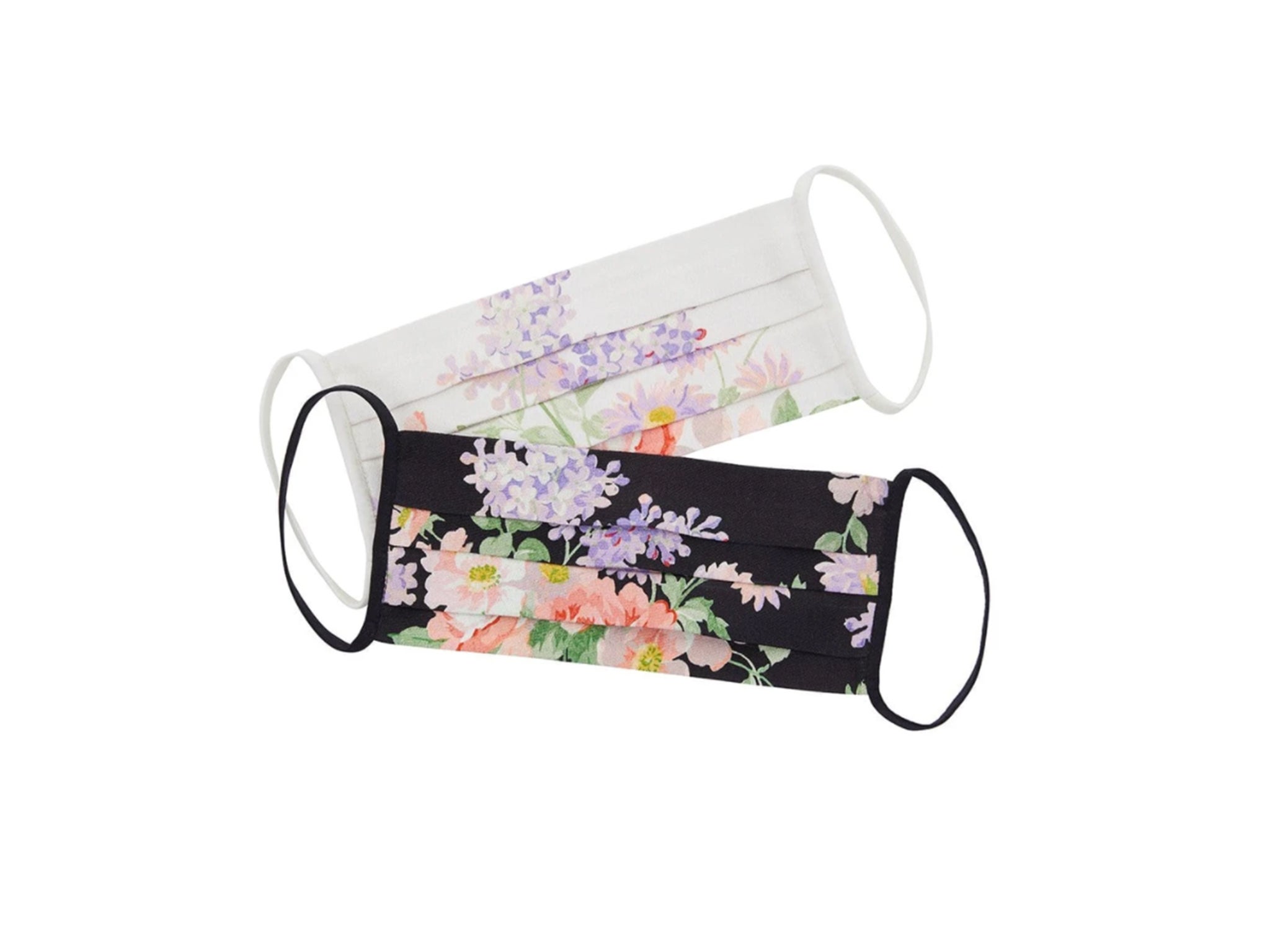
It's double-lined with elastic ear loops, with a pretty floral pattern. Each purchase also supports mothers2mothers, an organisation that is working to eliminate childhood Aids, with 50 per cent of all the profits going to their emergency Covid-19 appeal.
Ethical clothing brand, Not Just, has started making customisable face masks for £21.09) that you can have personalised with your initials or motifs such as your favourite football team, rainbows or zodiac sign.
You can also buy them in plain black for £14.99, and delivery is free on all mask orders.
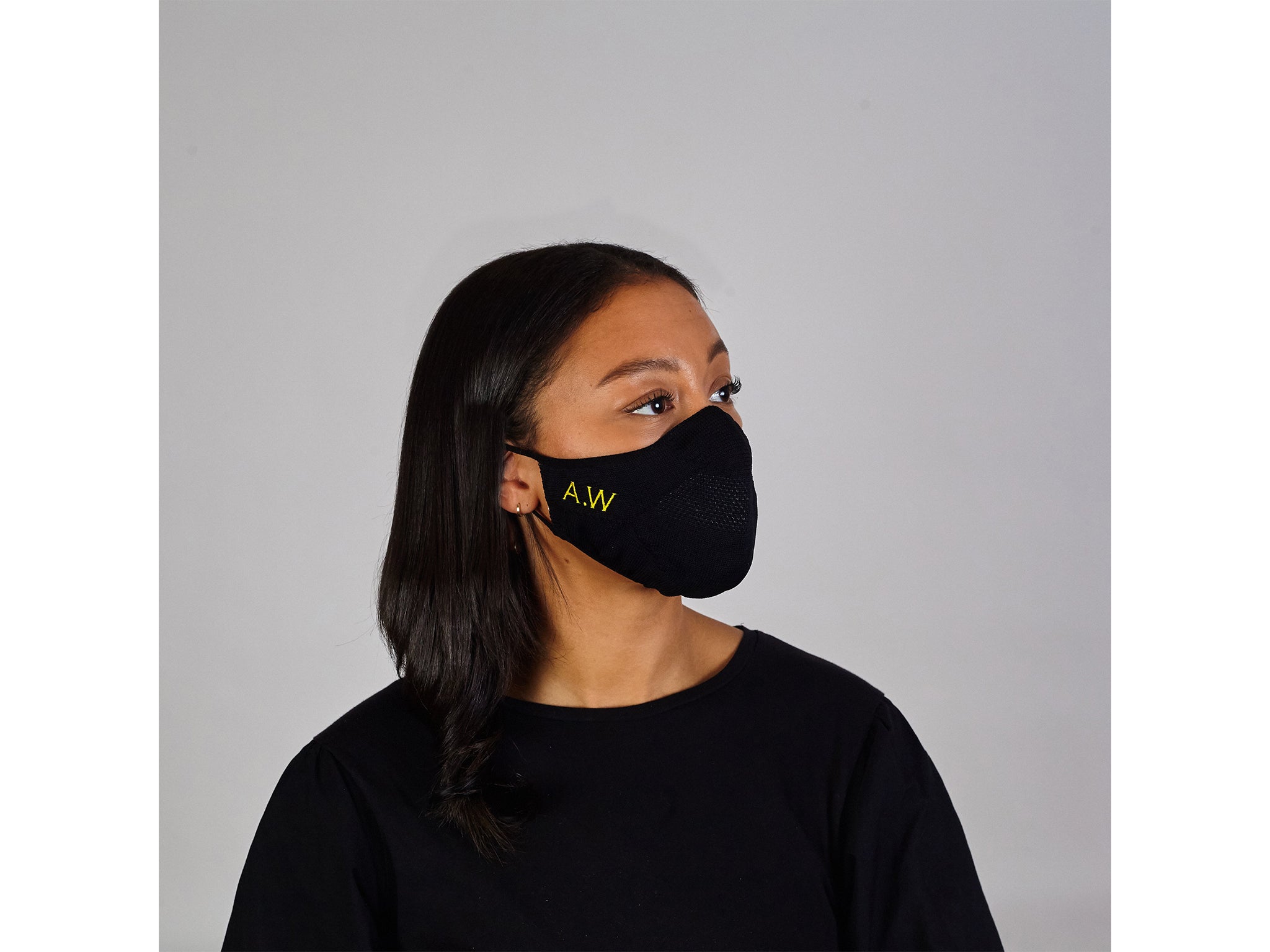
Made from a silver-based yarn that protects from bacteria and germs, they have fabric ear straps and from every mask sale, 50 per cent of profits are being donated to the NHS Masks For Heroes crowdfunding campaign, who are raising funds for essential PPE for frontline healthcare workers.
When shopping for a face mask, consider the 100% human face mask 5-pack (Everlane, £21) and stock up for your whole household in one order.
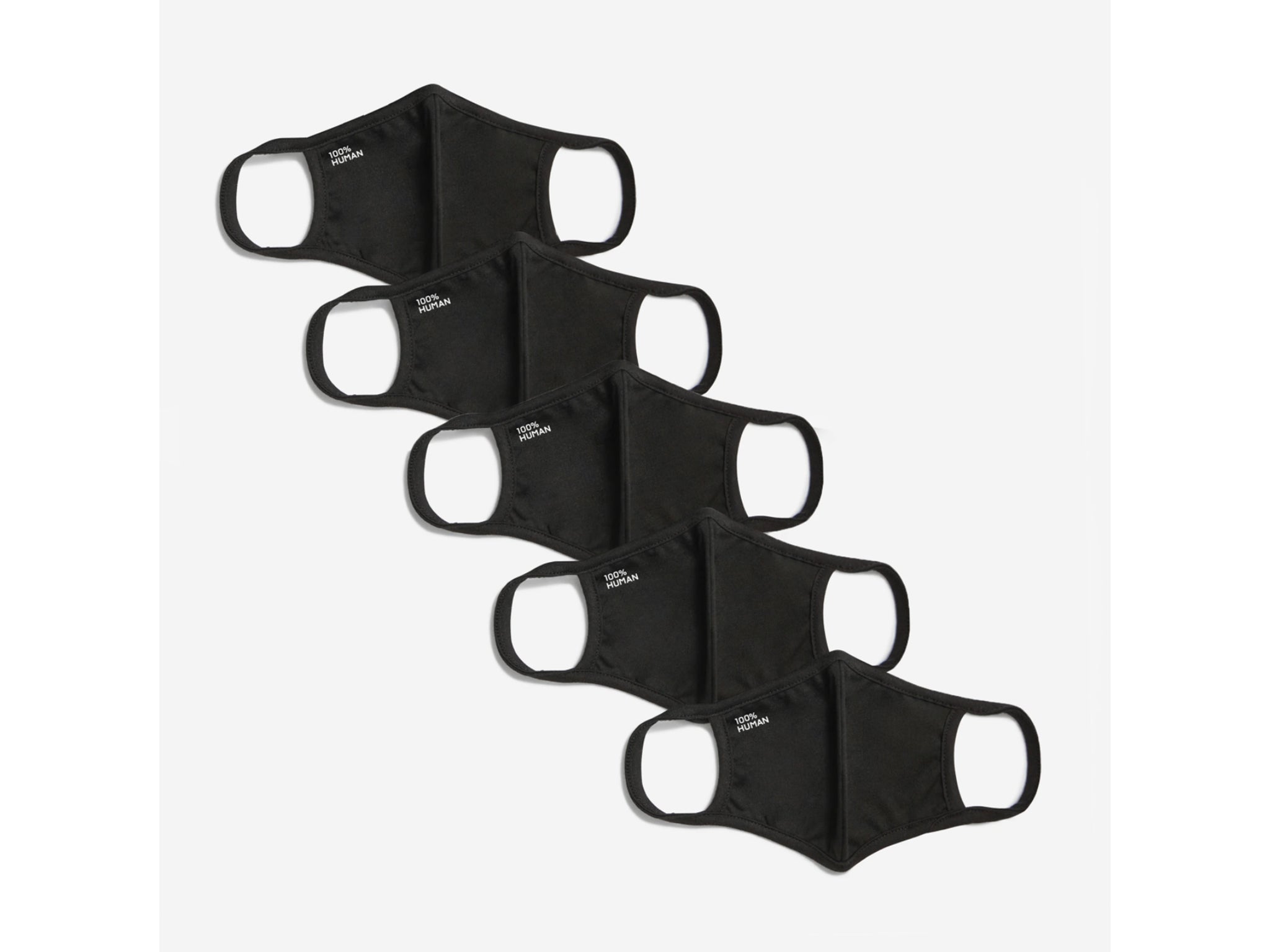
They're made from a double-layer knit cotton with soft fabric straps. From every purchase, Everlane will be donating 10 per cent of the American Civil Liberties Union too as part of their 100% human collection, whose aim is to raise awareness of human rights issues.
You can now buy these double-layered crepe fabric masks from online retailer Revolve, costing £20 for a pack of two.
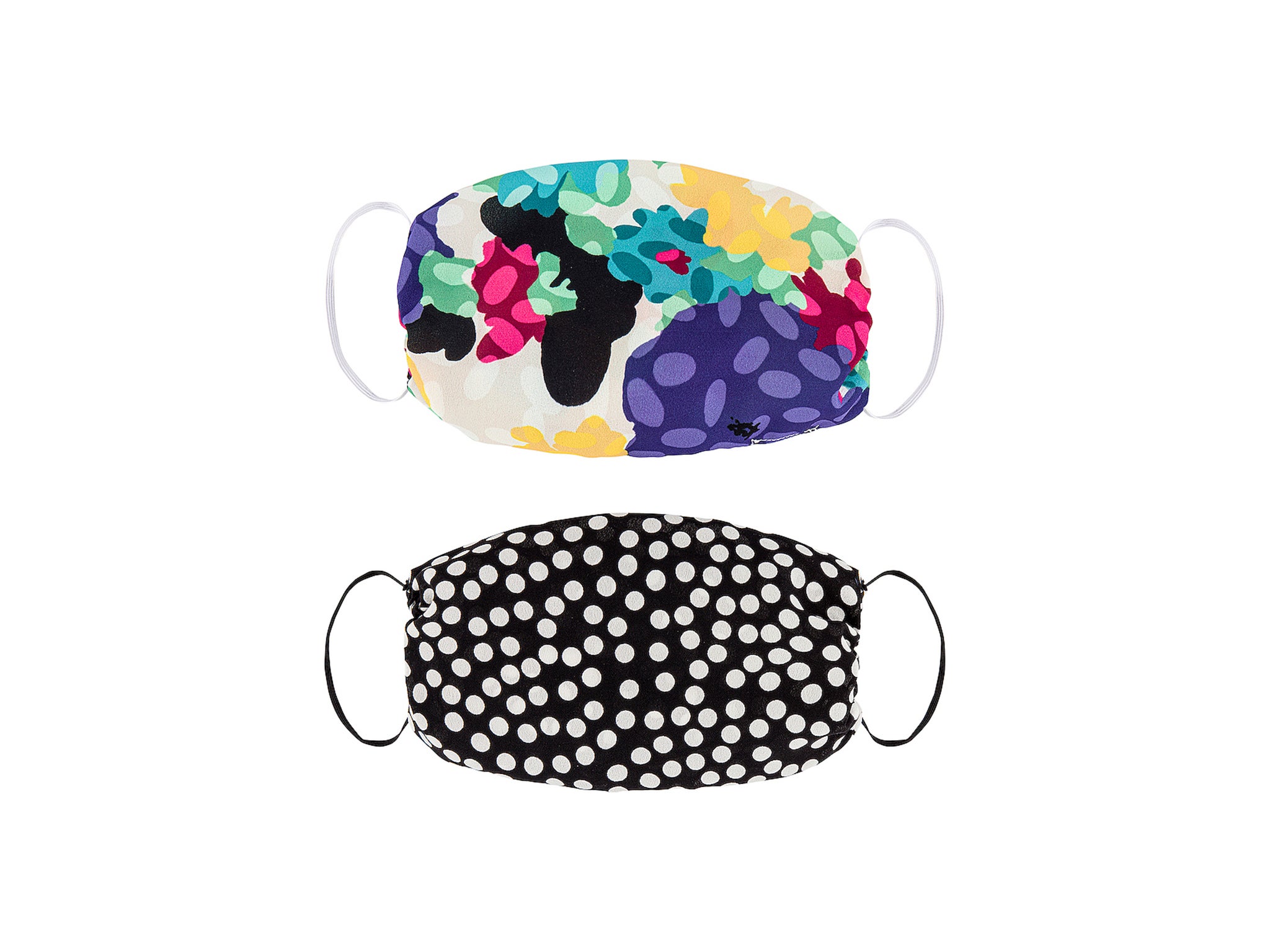
Available in brightly coloured patterns of flowers and polka dots, they also come with elasticated ear loops too.
Try this too shall pass protective face mask for £17 which has a reassuring embroidery messaging.
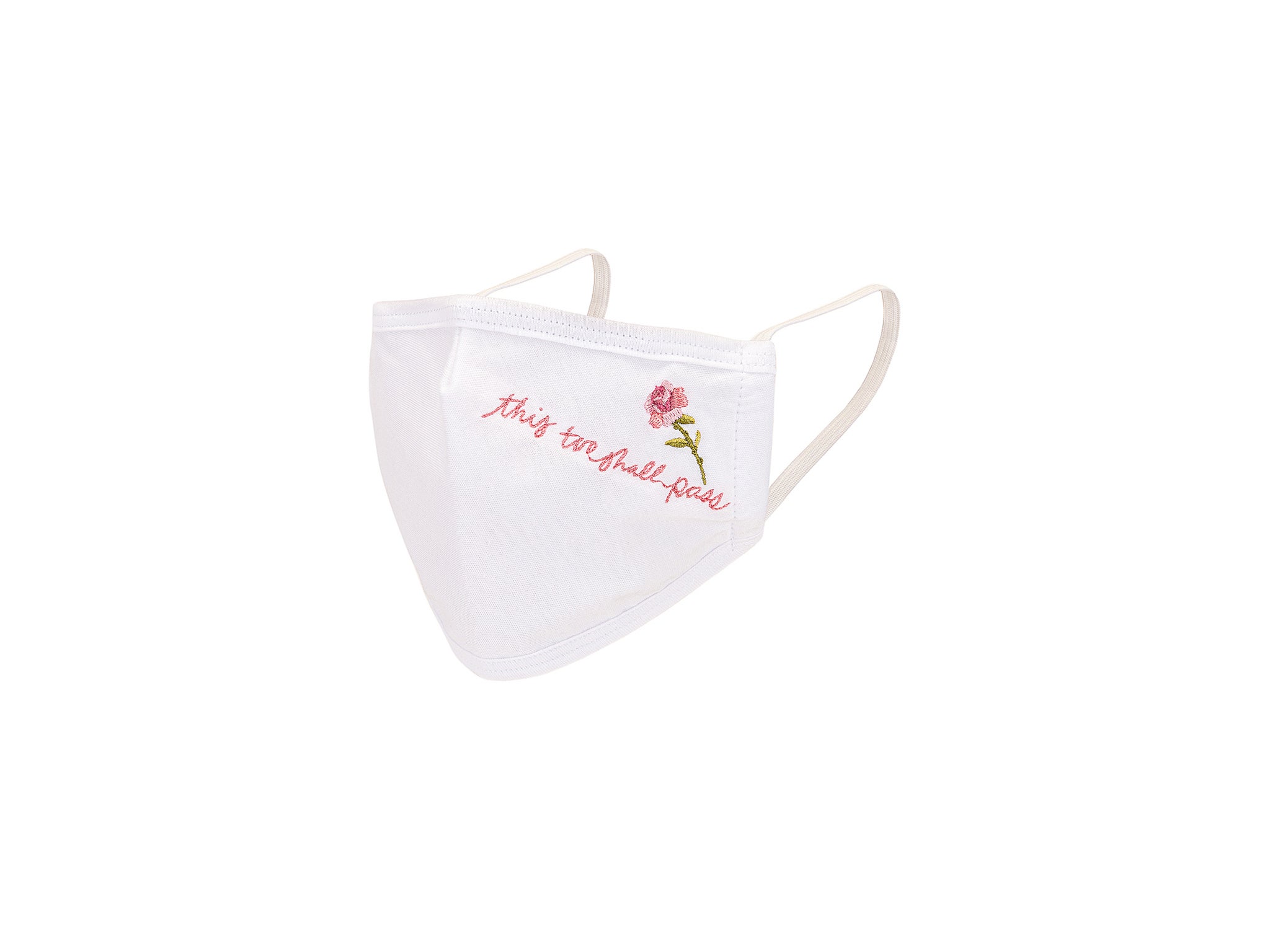
Made in double-layered cotton with elastic ear loops and an adjustable nose bridge, it'll feel comfortable on the skin and look good too.
Revolve is home to many different designs too, such as pastel shades, tie-dye prints, monochrome stripes and leopard print, so if you have a preferred style, you'll be sure to find one that suits you best while keeping you safe.
Born in Hackney, Pucker Masks was created by three friends during lockdown, Nik, Joe and Cathy.
All its masks, costing £17, are made in colourful designs by UK seamstresses who have been out of work due to the coronavirus and are paid a living wage. The fabric is three layers of breathable cotton with a shaped nose and chin, adjustable nose bridge and a pocket which you can insert a filter if you wish.
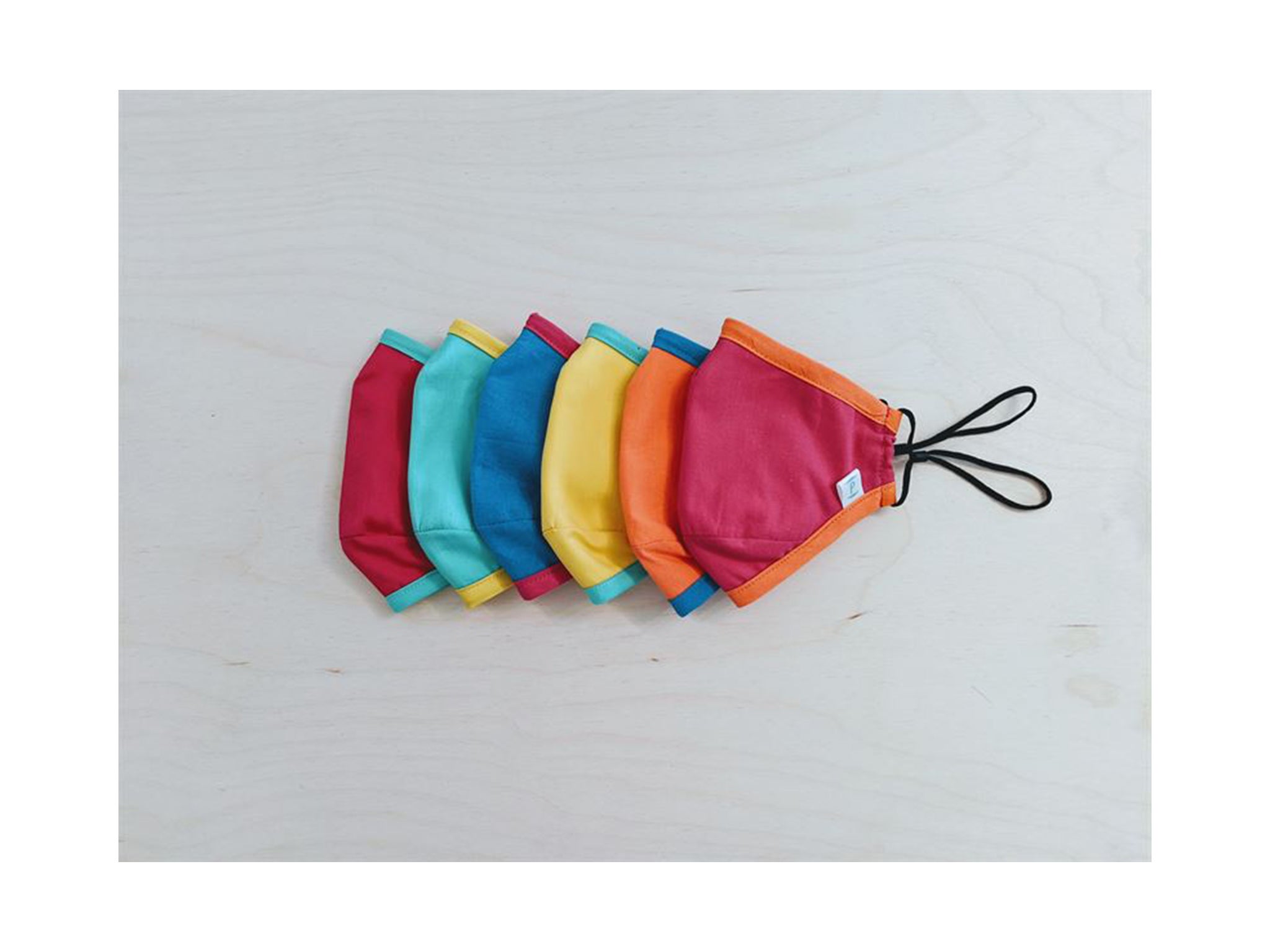
It's also donating 25 per cent of all profits made to three charities; Mind, Refuge and Crisis.
If you're looking to buy a multipack this Lost + Wander 3 pack face covering (Shopbop, £23.90) offers three assorted fabric designs with varying prints.
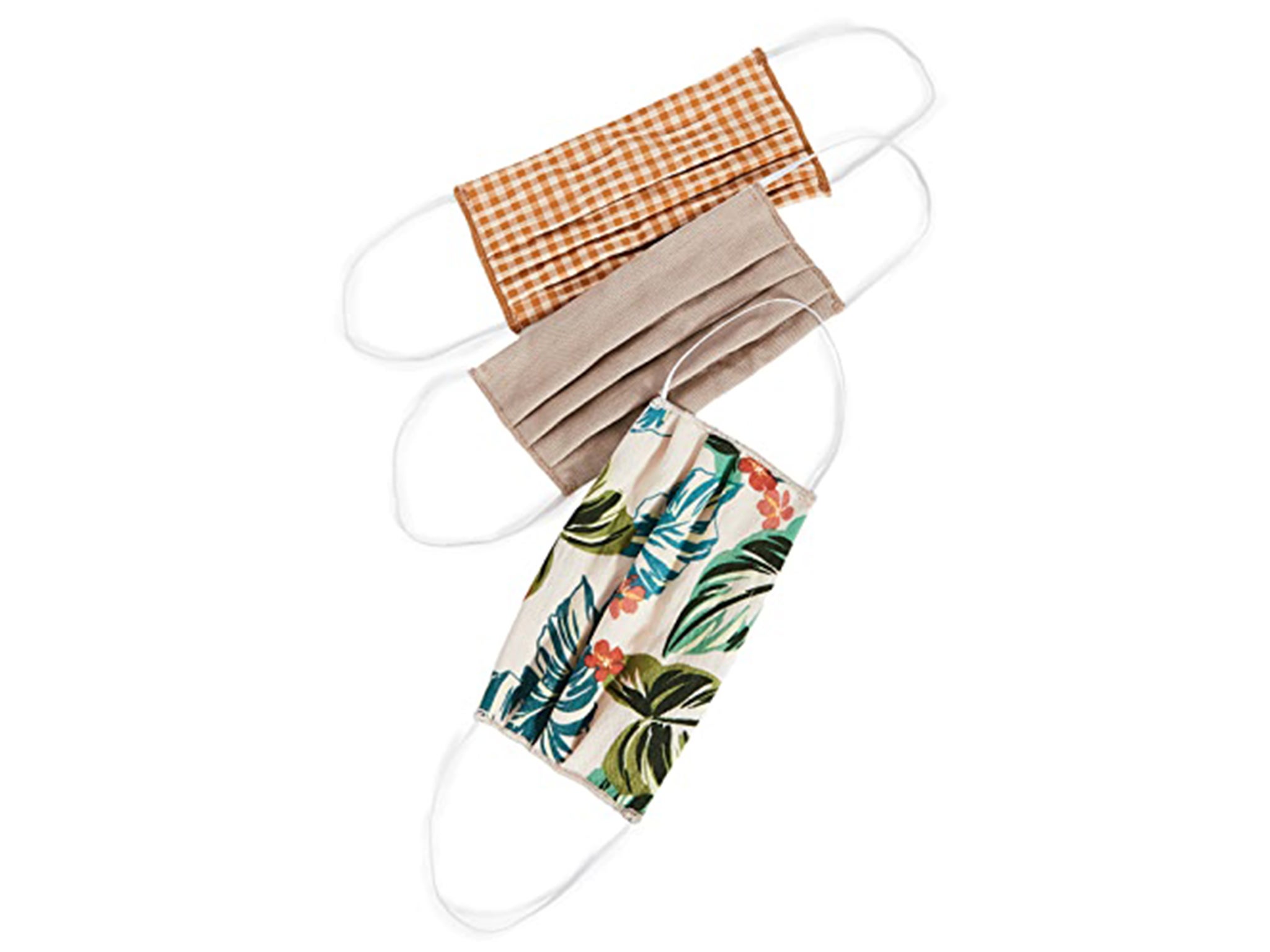
There's a cotton style, rayon and rayon and linen, each with elastic straps to keep them securely in place.
Contemporary British womenswear brand Isabel Manns works with sustainably conscious seamstresses who ensure the fabric is cut to minimise waste for their scarves, dresses, jumpsuits and more. All are reversible too.
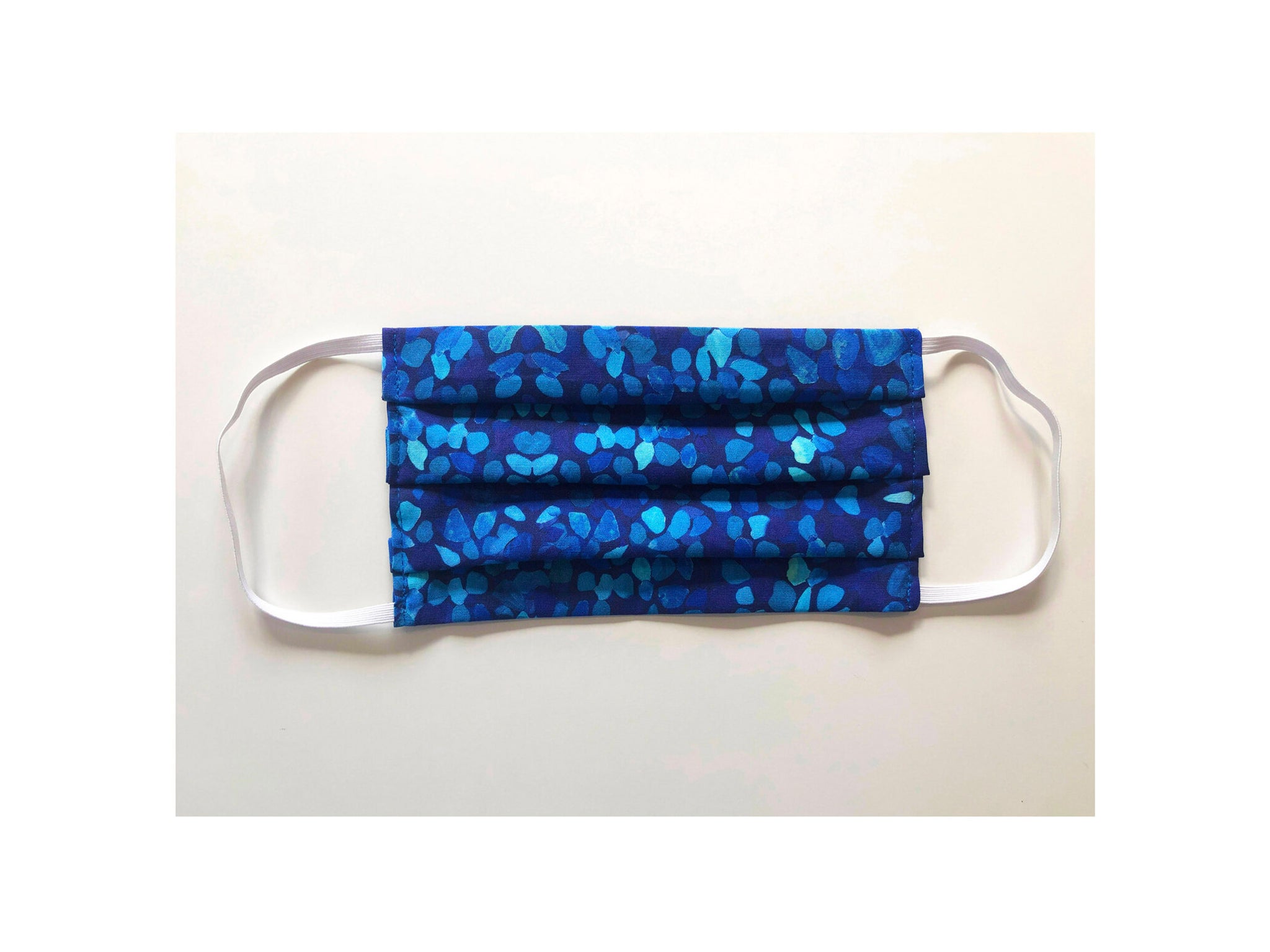
It has since created vibrant lines cotton masks for £12 in three varying colours, in different pinks and blue with elastic ear loops and room to add in a filter if you choose.
This UK-based charity has teamed up with 10 artists, including Camille Walala and Mike Perry to create reversible, reusable and washable face masks for £19 each or £79 for a pack of 5.
Its #masksformeals campaign has been set up for 100 per cent of its net profits from the masks sold, to be sent to Refugee Community Kitchen to help them feed the UK's homeless.
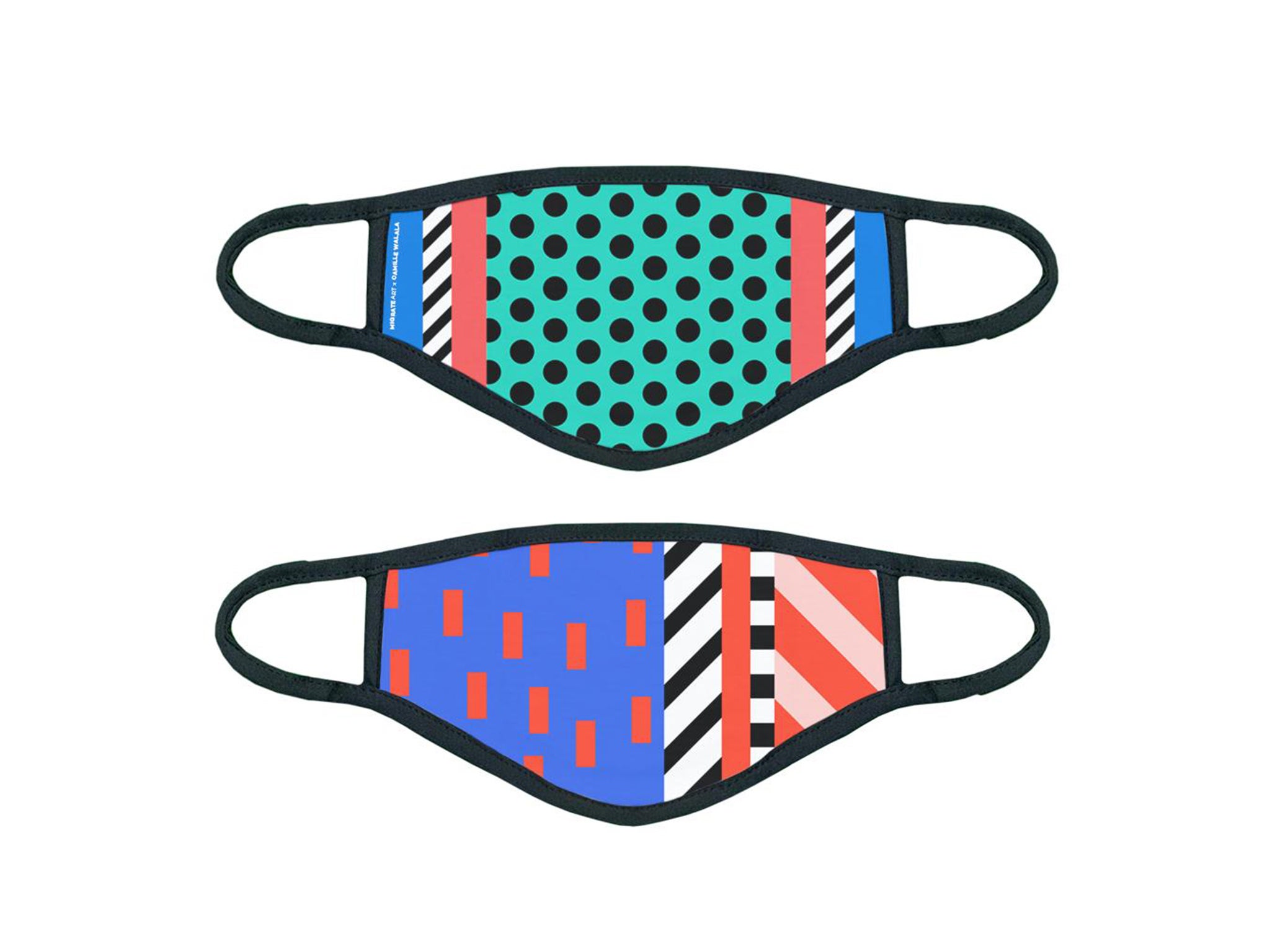
Each mask is double-layered and made in breathable 100 per cent cotton.
This Midlands-based casual wear label has designed face coverings to buy from £9.99, having diverted its manufacturing process to create a range of different styles.
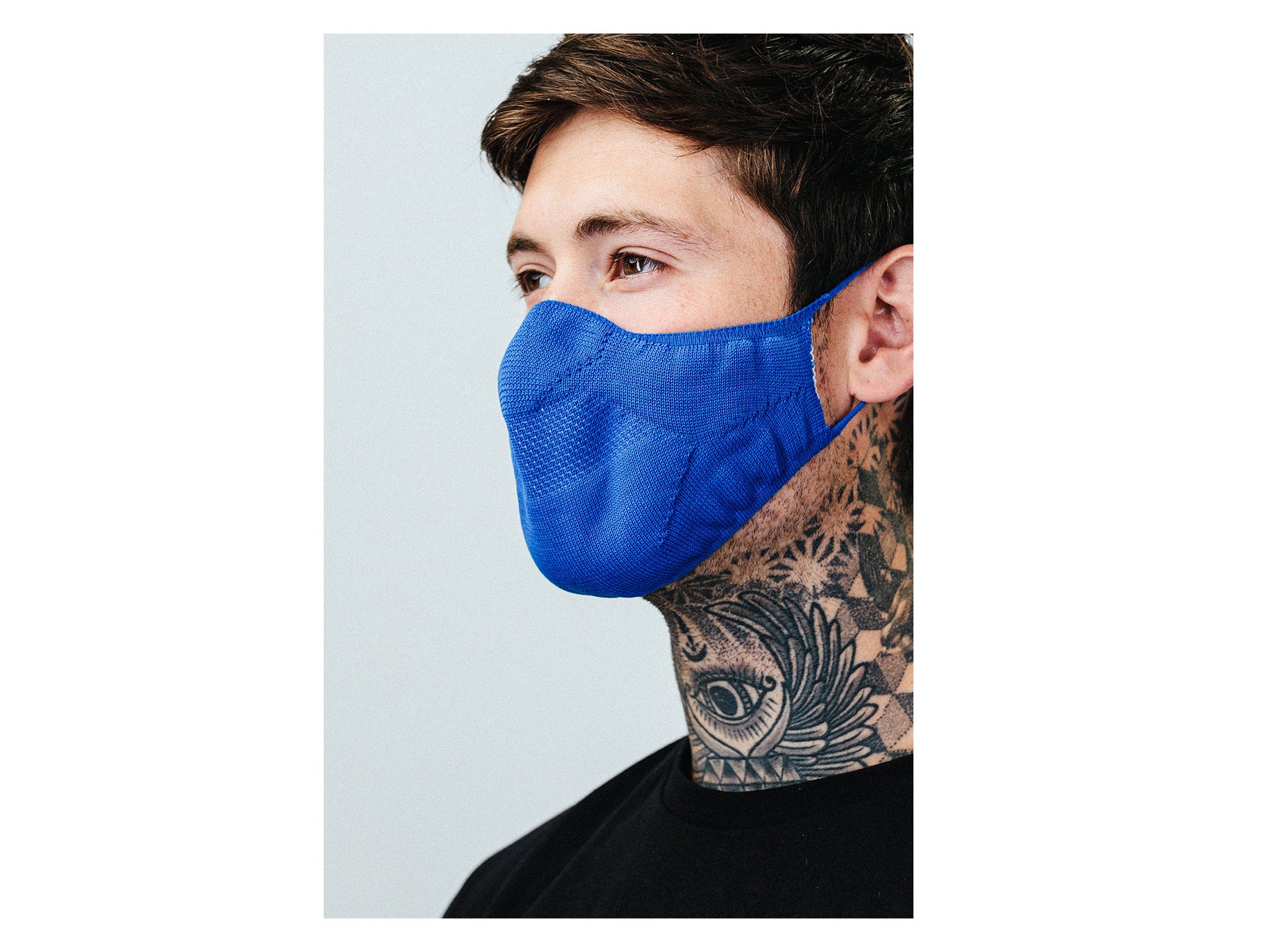
They come in varying machine washable prints, such as camo and tie-dye, and can be bought individually or in packs of three.
Made in sizes for both adults and kids, some packs for the latter donate all profits to the NHS, too.
The health and beauty retailer is selling reusable face masks that give back during the pandemic.
For every covering sold, 30 per cent of the profits will be split equally between its five charity partners, which include domestic abuse charities Women's Aid and Refuge, and breast cancer awareness charity CoppaFeel!
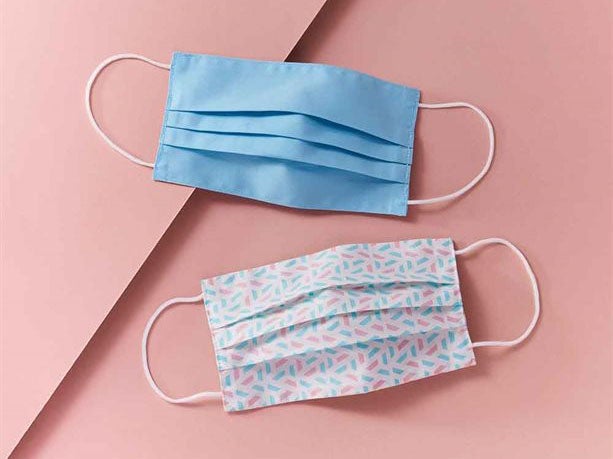
Available in a pale blue or geometric pattern, the ply cotton masks cost £3.50 each and are machine washable at 40C. You can also purchase them in bundles, as Avon offers three for £9 and five for £14 deals.
Known for its high quality silk eye masks and pillows that protect your skin and hair as you sleep, this luxury brand has turned its hand to face coverings.
Available in four designs – black, leopard print, blush pink and lip print – the mask is crafted from 100 per cent mulberry silk.
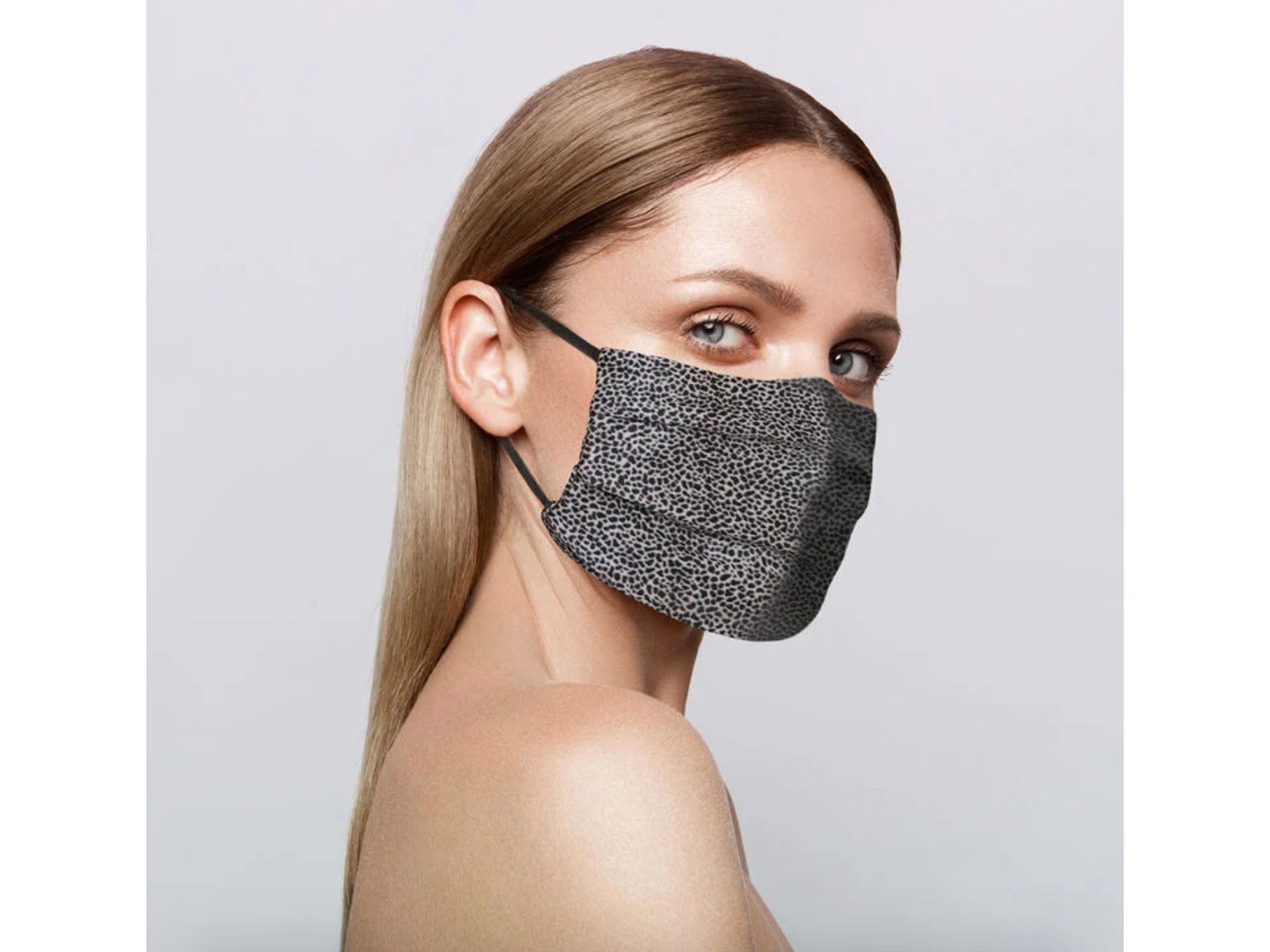
It features adjustable ear straps which make for a comfier fit, and an adjustable nose wire inside to keep the covering secure.
At £39 each, they are pricey, but you're paying for the premium materials which will make these masks last.
This brand is headed up by 27-year-old freelance theatre prop maker and set designer, Alice Cox, who started creating bespoke face masks from old designer fabrics from her spare room in Kennington, London.
She has designed them with a pocket large enough to fit a filter and non-elastic band that will minimise irritation around your ears.
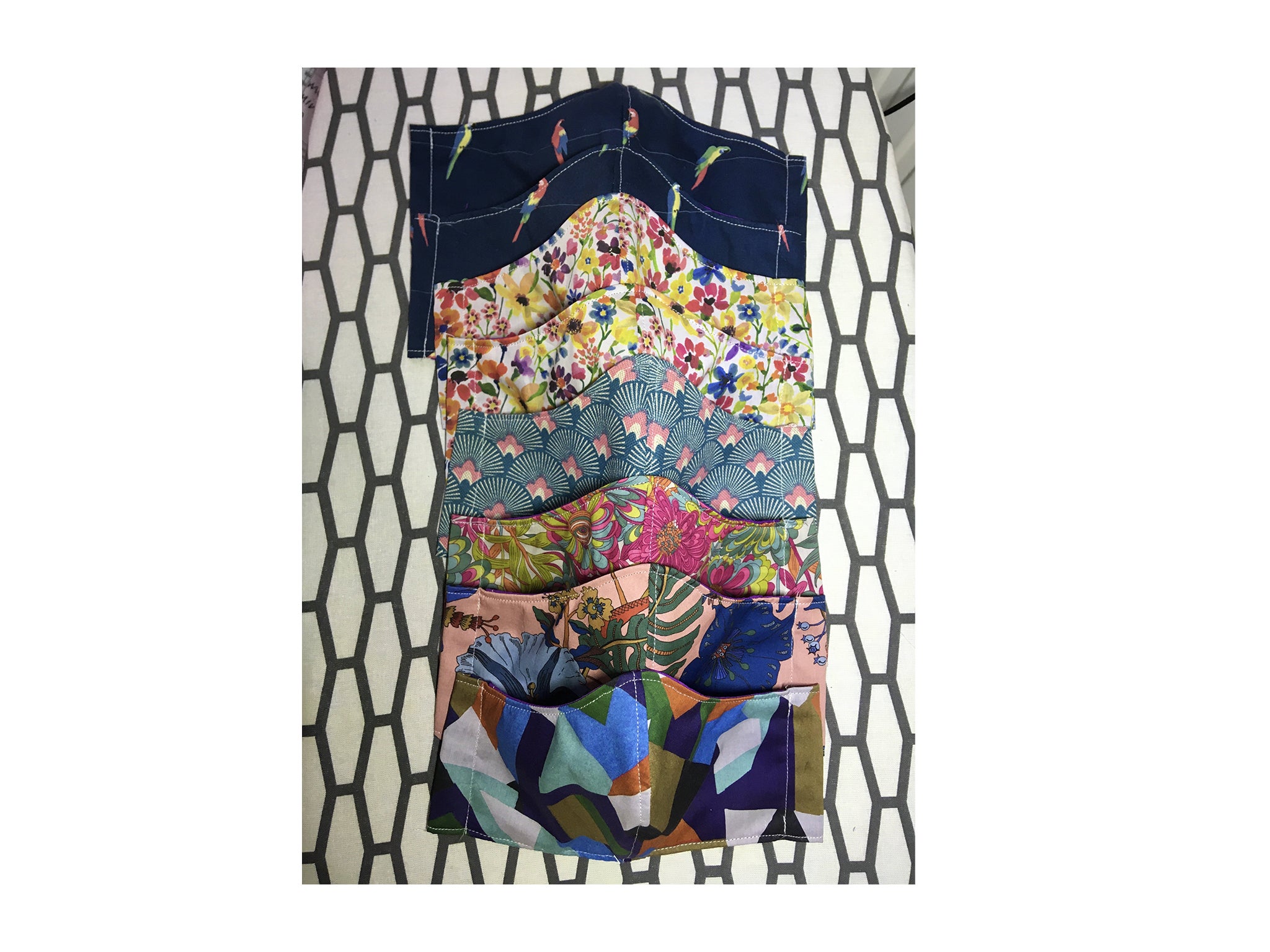
To place an order, email your choice of colour and material to alicecoxcreative@gmail.com. One mask will cost you £10, unless you want the liberty-printed style, which is £15.
This London-based fashion designer and label, Florence Bridge, creates contemporary womenswear pieces with a sustainability focus at its centre.
In light of the coronavirus outbreak, the brand has created unisex face masks for £12 in a myriad of colours, prints and fabrics, which are machine washable.
Each one has a 100 per cent cotton lining for maximum comfort against your skin.
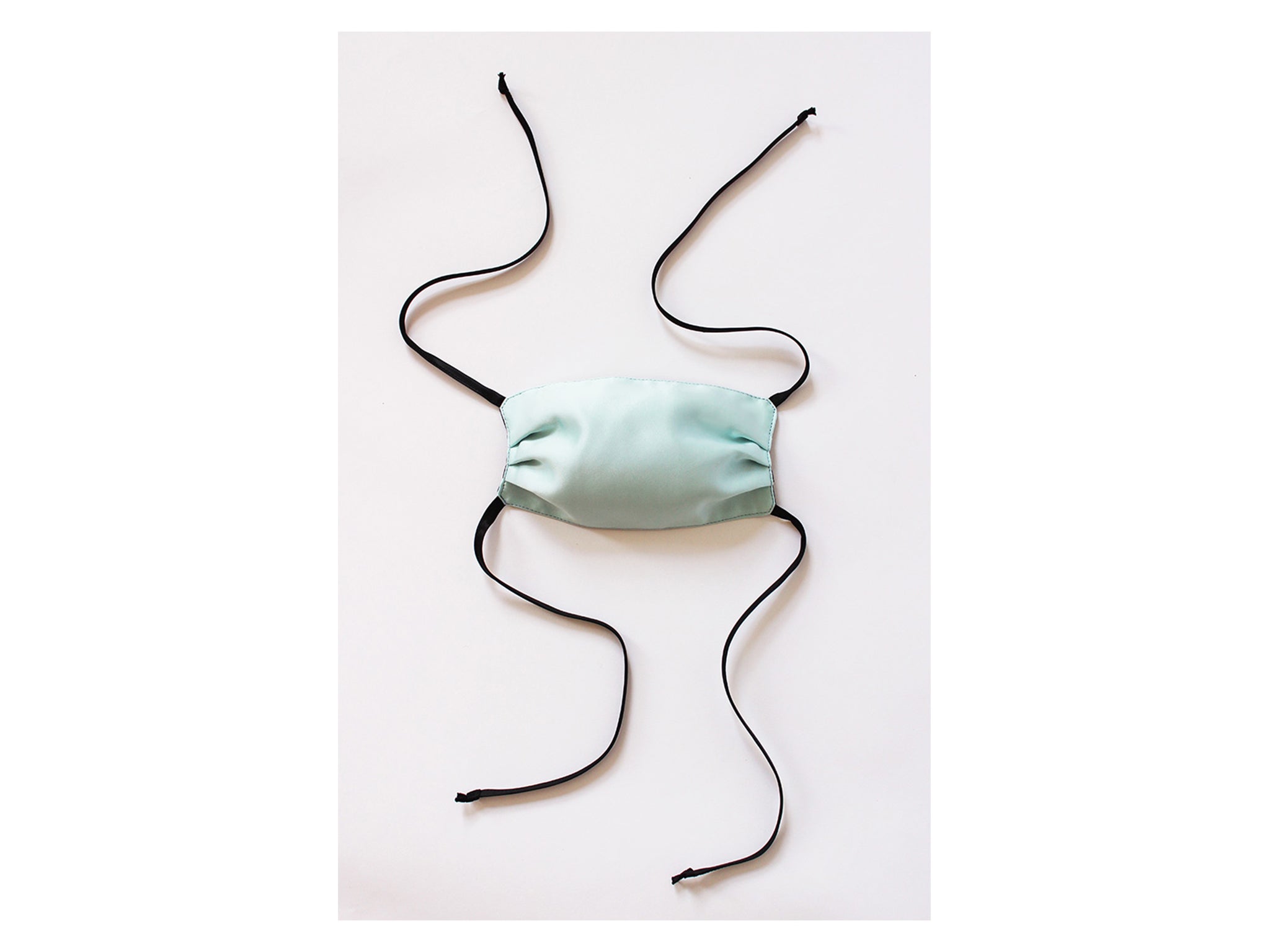
A portion of profits from the sale of the masks will be going to Fuel Our Frontline charity, who are delivering essential groceries to hospital workers around the UK.
Manchester-based apparel brand, Wawa Clothing, has diverted its production towards making face masks made from 100 per cent organic ripstop cotton.
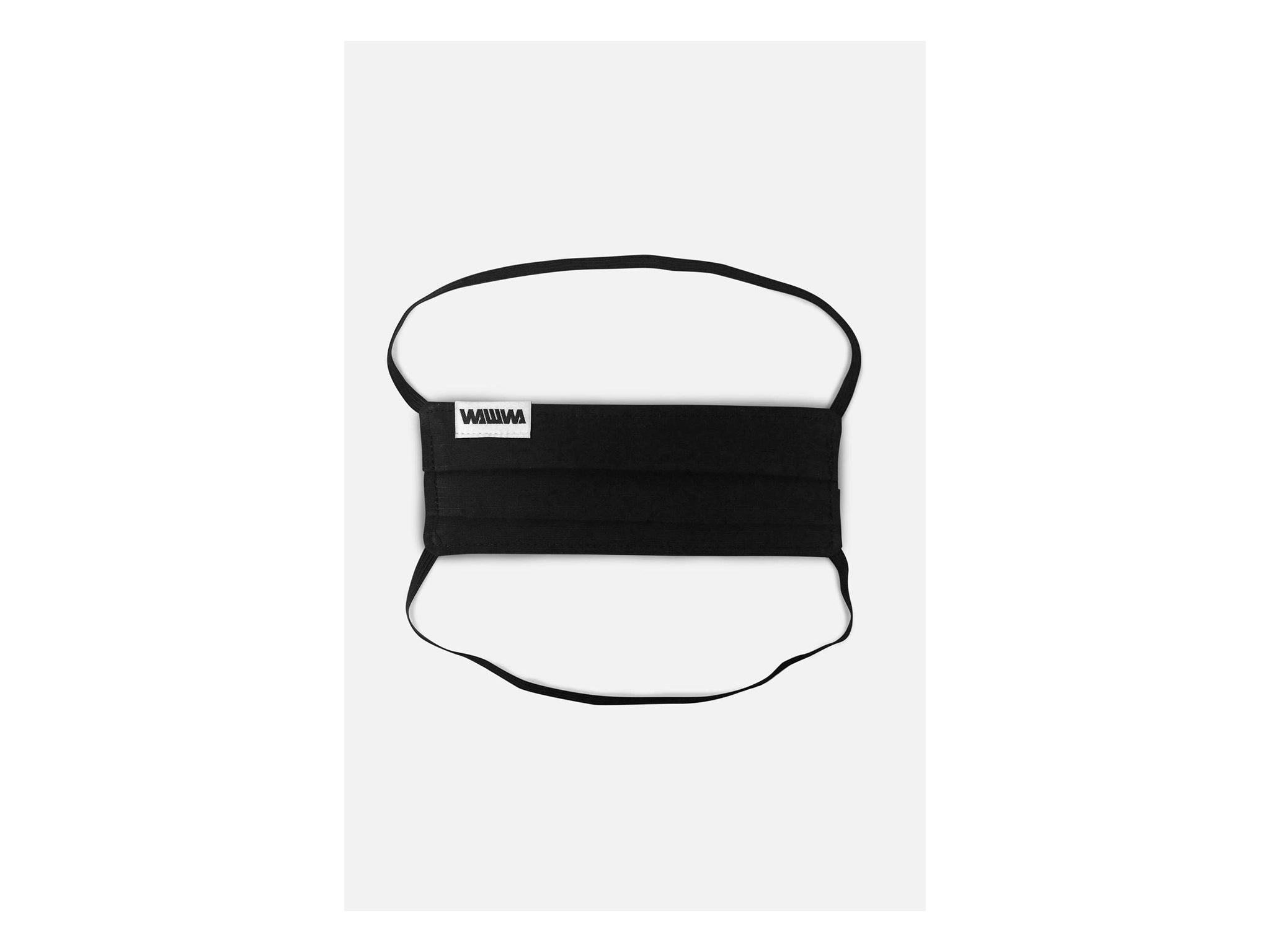
It’s washable, can be kept securely around your mouth and nose with the elastic loops and the label is made from recycled polyester.
They are available in black or forest green and cost £12.
For £13, Good Ordering is selling reusable face covers made from two layers of 100 per cent natural fabric, with at least one layer that is densely woven for more protection and elastic straps, which also allows you to insert a filter on the inside. They're currently sold out, but you can leave your email here to be contacted when they become available again.
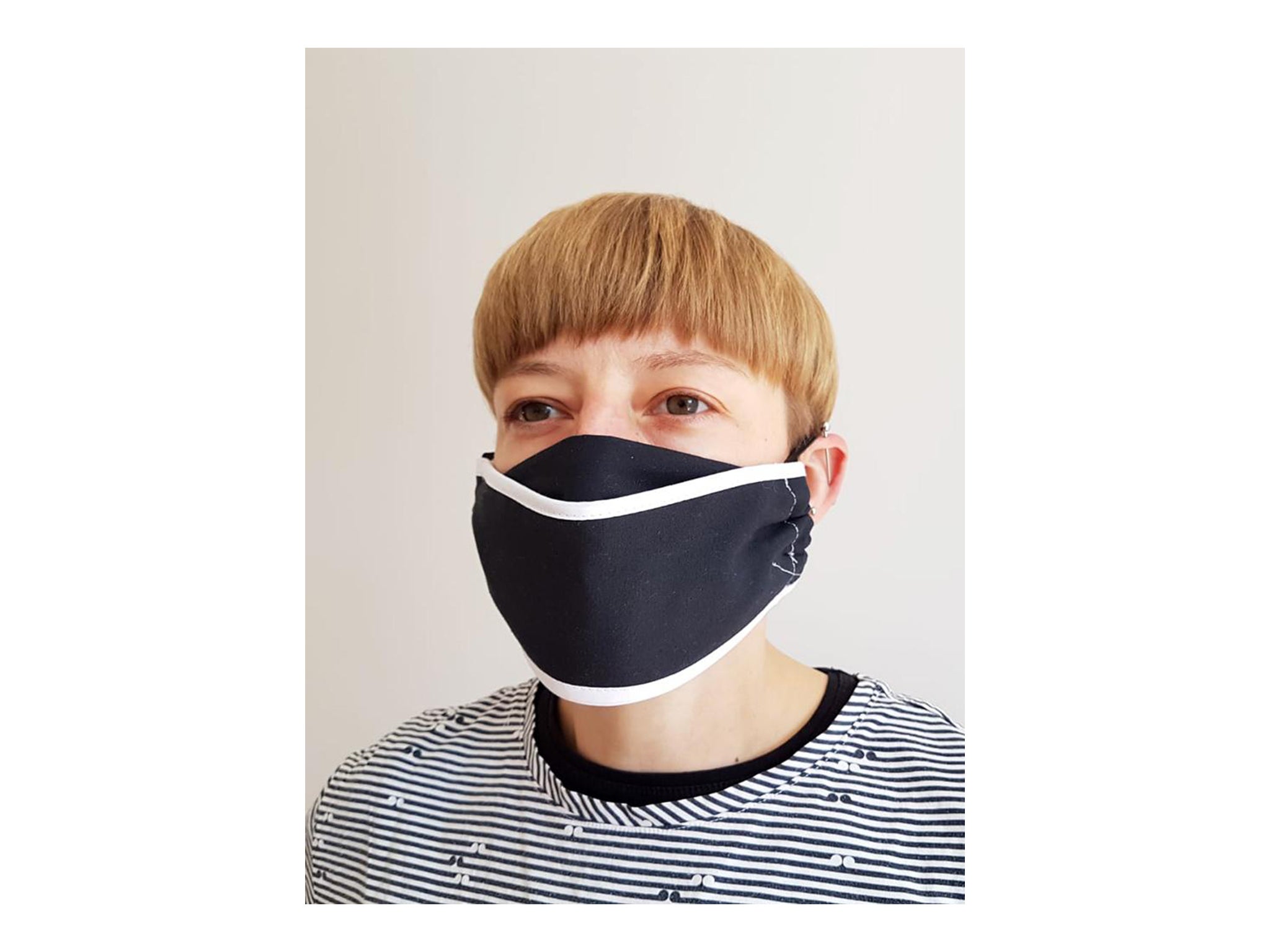
The face covers come in one size for adults, but you can request extra-large as well as children's sizes. They are also selling filters too, which you can buy here.
All the fabrics used to make the face covers are made from recycled or remnants of material in collaboration with a local costume professional, and while it washes the fabrics at a high temperature before production, Good Ordering advises to wash the product before use too.
Here you can buy a four-pack of masks for £15 and even design your own artwork to decorate them. If you’re not feeling creative, you can also shop designs that are already made.
The masks are available in small, medium, large or extra-large – so pick the size you want and you'll get four of the same in your pack.
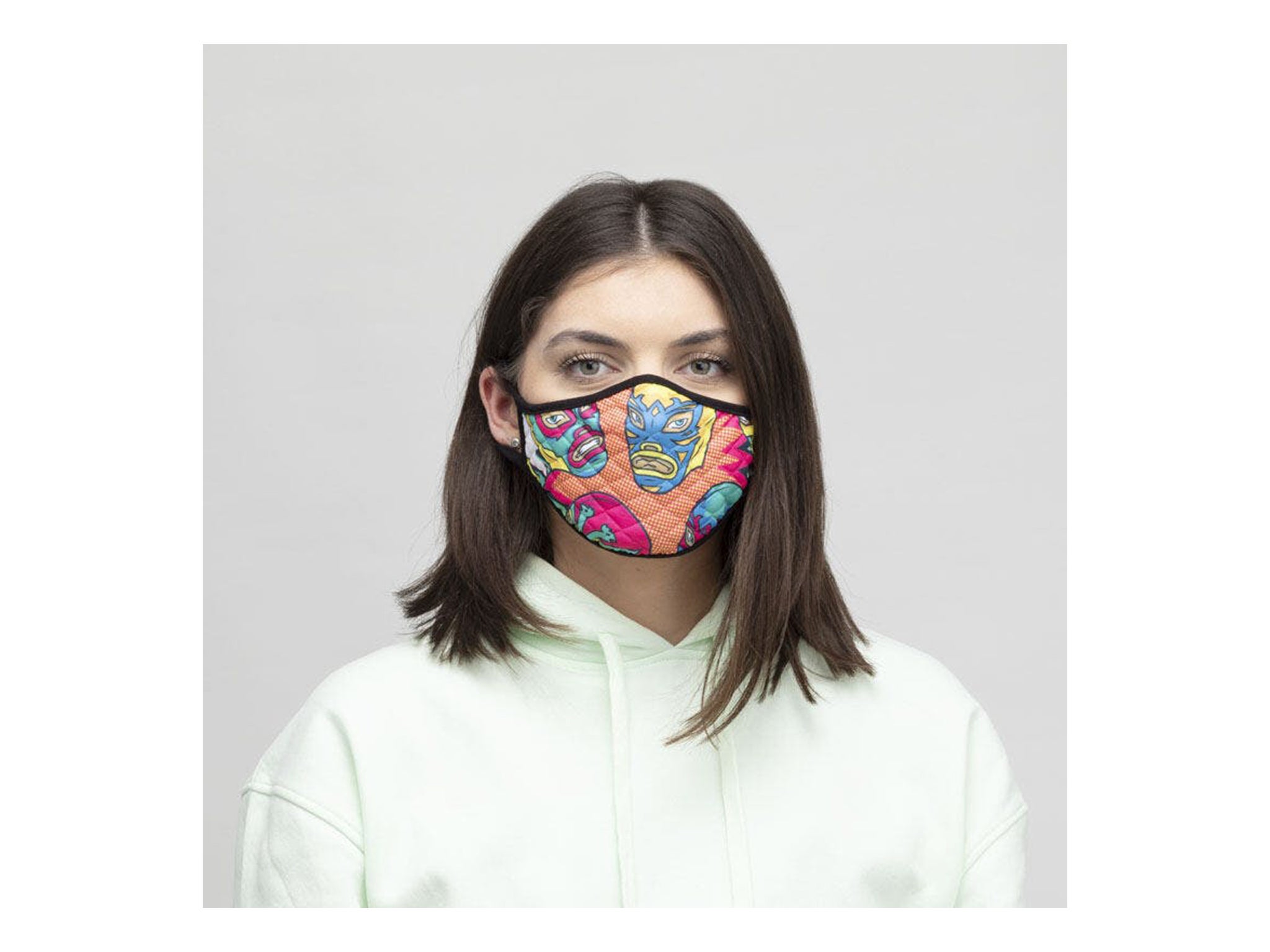
The brand advises to wash the masks after each use, at 60 degrees.
It describes the fabric of the masks as high-quality and breathable, lasting up to 100 washes, but advises not to tumble dry.
Luxury womenswear label, Plumo, has made protective masks costing £10 each, with four layers of organic linen, which the brand uses for its naturally antibacterial properties, as it's not an easy environment for germs to breed in
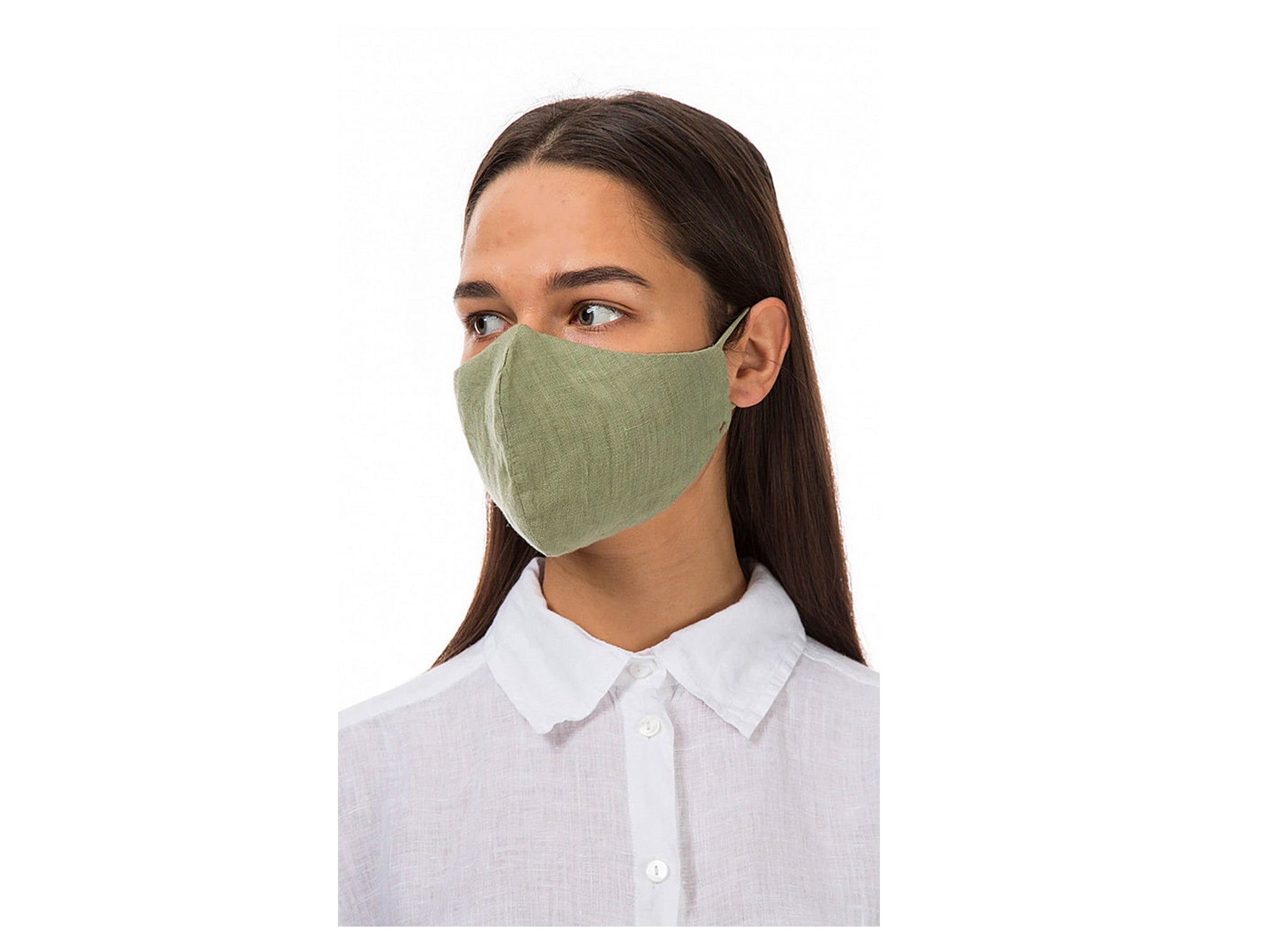
Available in 19 different colours and prints, they can be washed at 90 degrees and are reusable.
For every mask sold, Plumo is donating to Masks for NHS Heroes, a crowdfunding campaign raising money to provide Personal Protective Equipment (PPE) to protect healthcare workers.
If you want bold, colourful designs for your face covering, head to Newt, which has designed reusable, washable face masks in its signature fun prints on biodegradable fabrics.
The material has a tight weave like cotton, but absorbs moisture better than cotton does.
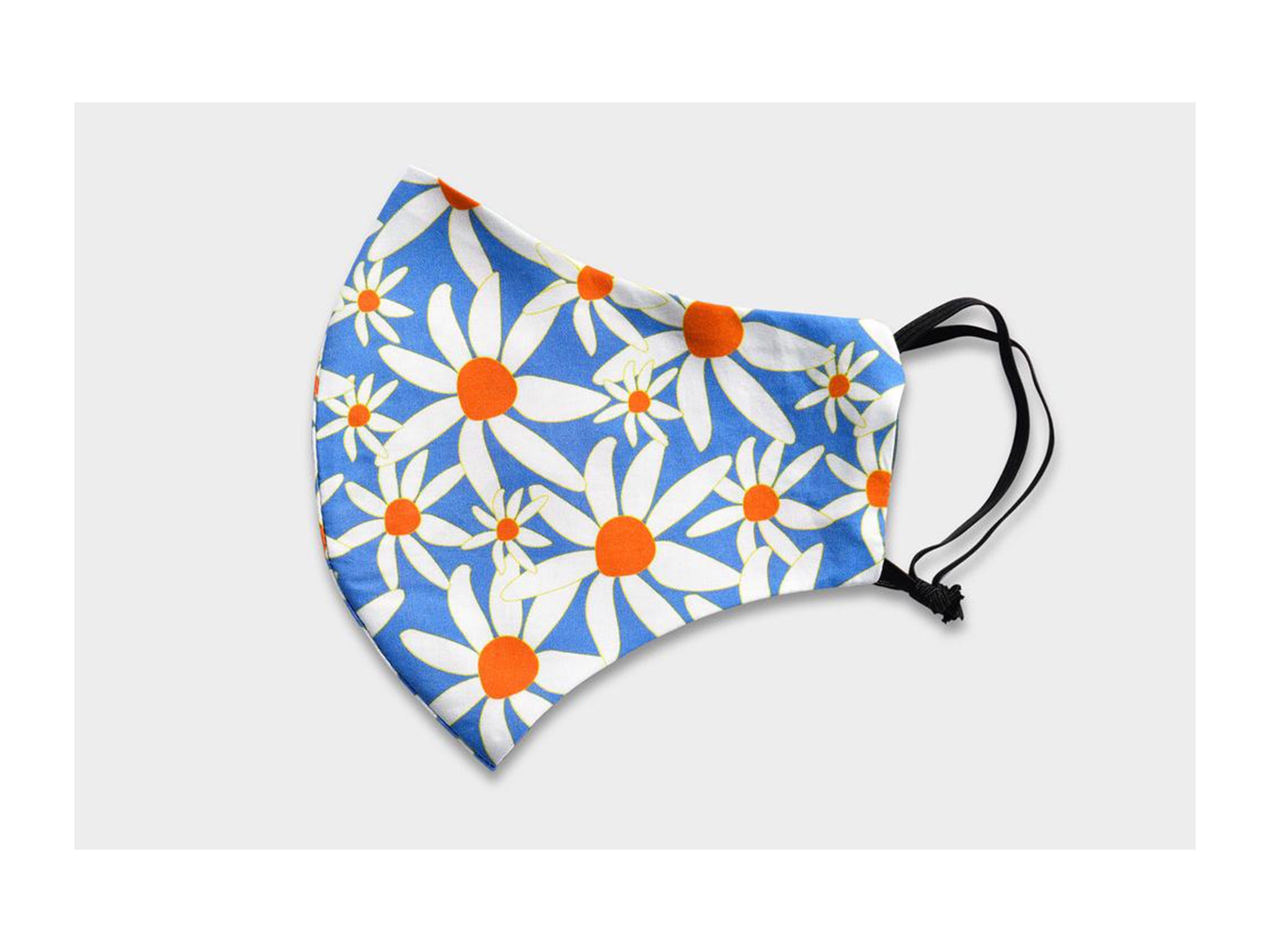
All its masks are made for adults, have adjustable ear straps and are reversible too.
There's six designs and each one is £15.
Husband and wife duo, Tim and Ara, are behind Aeibe, creating filtered face masks for £45.
It follows scuppered plans for a new collection with material coming from Italy before the coronavirus hit, so Tim and Ara got creative and sourced fabric from Liberty of London instead. The result are pretty floral patterned masks that add a bit of fun to trying times.
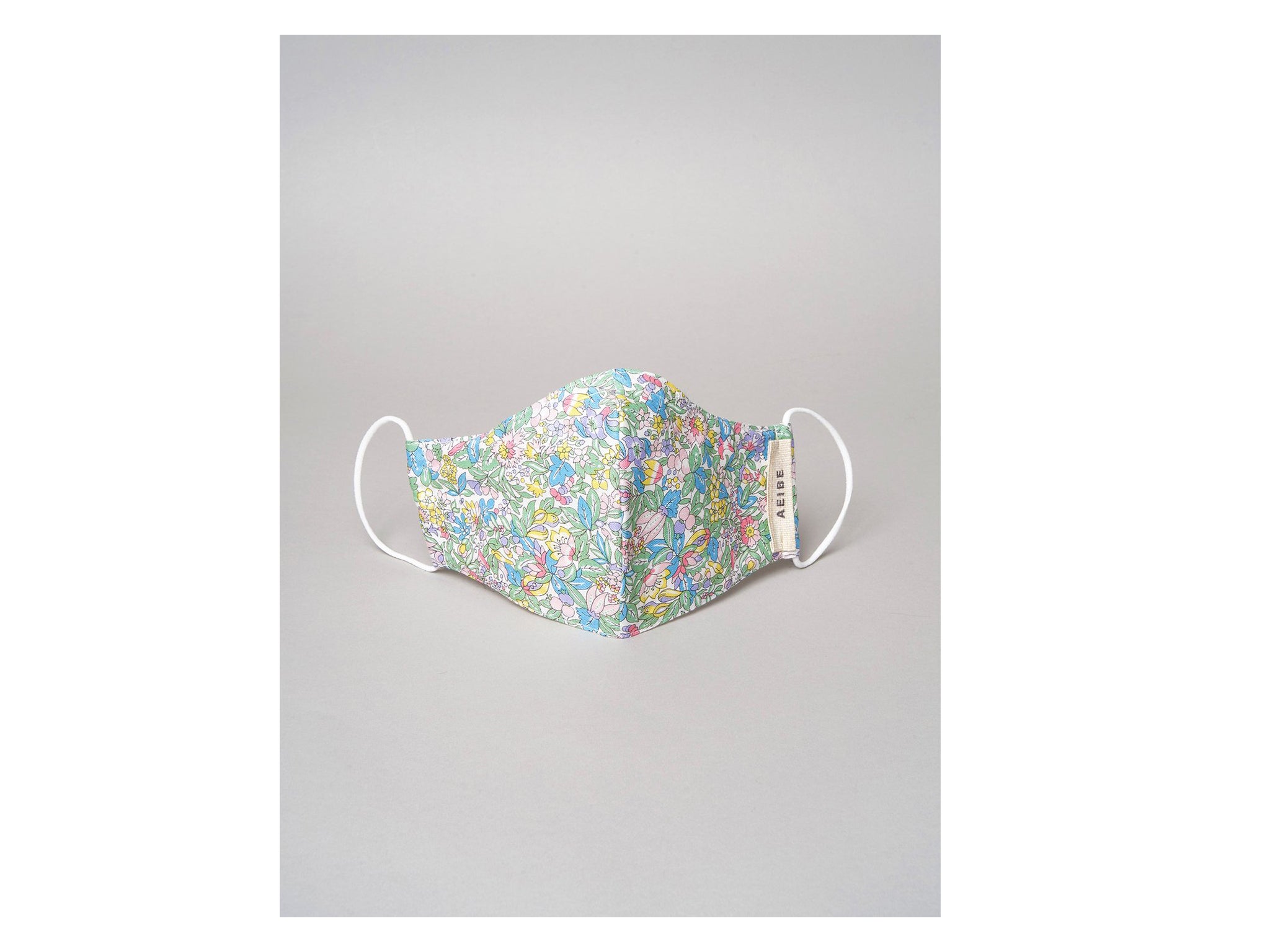
Every mask is made in England with 100 per cent cotton lining and 100 per cent non-woven polypropylene filters from Korea on the inside. It also has a soft nose clip to help it shape to your face and stretchy ear loops to keep it secure.
They also come with a cotton bag to keep it safe when you're not wearing it and a spare filter.
Just make sure to remove your filter and hand wash it at 30 degrees before you put the mask in the washing machine.
Voucher codes
For the latest discounts on face coverings and other fashion offers, try the below links: